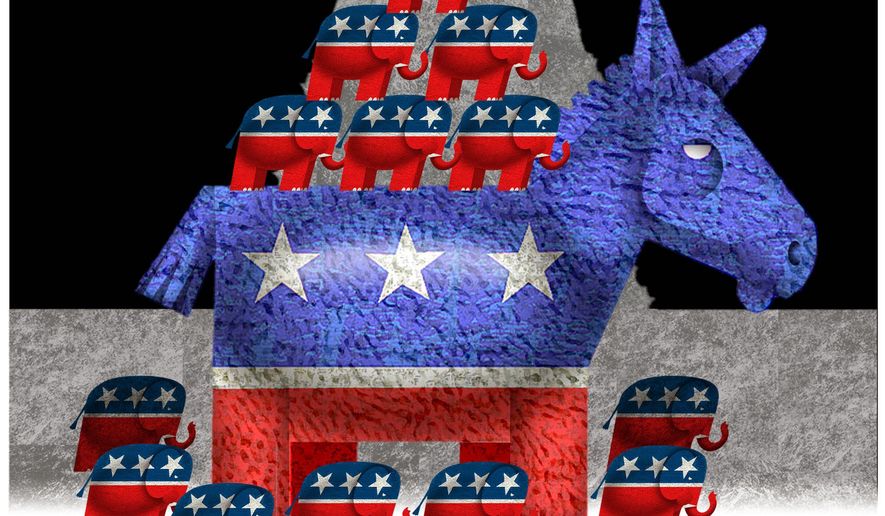OPINION:
In the wake of the disastrous vote by the 13 House Republicans for President Biden’s “infrastructure” legislation, a lot of people are understandably angry. They counted on the Republicans to recognize that the bill was not very good. Counting on politicians to recognize anything is always chancy, but in this instance, it seemed reasonable.
The legislation had numerous, obvious defects. The most glaring problem is that less than 10% of its spending is dedicated to roads and bridges. It also sets the table for a tax on miles driven, which eventually will be enforced by onboard computers automatically reporting to the government how many miles you’ve driven and where you’ve gone.
It mandates ignition interlocks for new cars. These mechanisms prevent the automobile’s operation if the driver is unable to pass a breathalyzer test, but it can be used for a variety of different purposes. It’s possible that at some point, the government may simply be able to shut down your car for whatever reason or no reason. Wrongthink? Unpaid bills? Tax disputes?
The legislation also establishes a protected class based on one’s “real or perceived” gender identity. The relevant section reads: “No individual in the United States may, on the basis of actual or perceived race, color, religion, national origin, sex, gender identity, sexual orientation, age, or disability, be excluded from participation in, be denied the benefits of, or be subjected to discrimination under any program or activity that is funded in whole or in part with funds made available to carry out this title.”
This appears to be the first time that gender identity has gained protected status in federal law. Everything is, apparently, infrastructure.
Finally, and most importantly, the legislation is a gateway drug for the truly destructive reconciliation legislation. Failure of the infrastructure bill would have greatly complicated the problems within the fragile Democratic coalition.
However, thanks to the careless 13 House Republicans and their 19 Republican counterparts in the U.S. Senate, Mr. Biden and his allies instead get to talk about their bipartisan infrastructure “achievement.”
Despite the more hysterical claims, these Republicans are not traitors. In many instances, they are not even bad people. Some of them are never-Trumpers who are still angry at the party for nominating him (Rep. John Katko of New York, Sen. Lisa Murkowski of Alaska). Some are soon-to-be retirees focused on their next gig (Sen. Rob Portman of Ohio, Rep. Adam Kinzinger of Illinois). Some are not the sharpest tools in the shed (Rep. Fred Upton of Michigan, Sen. Lindsey Graham of South Carolina).
What they all have in common, however, is that they are not very good legislators. Whatever you think about the infrastructure legislation — good, bad or indifferent – the one thing upon which everyone can agree is that there is not a single Republican priority promoted anywhere in the legislation.
In 2,300 pages of text, the 32 Republicans who voted for the legislation could not insert even a sentence advancing or even addressing anything remotely useful.
Keystone XL pipeline? Nope. The postponement of oil and gas leases? Nope. Giving states more flexibility? Nope. Any protection from the federal regulatory tidal wave heading toward us? Not a peep.
It’s undoubtedly the most significant and probably the most remarkable failure of legislating in living memory. With the other side divided, in disarray and needing votes, the Republicans had all the leverage and managed to use none of it to kill the proposal entirely or advance anything meaningful or helpful.
We will suffer through a bill signing ceremony for the “infrastructure” legislation next week and enjoy endless references to the “bipartisan” nature of the bill. There will probably be appearances by a handful of Republicans.
As you watch the festivities, remember that some of the Republicans who made it possible might be unreliable or reliable, might be unbright or very bright, might be addled or spry, might be ready for retirement or in their prime But the one thing they all have in common is that they are not very good at their actual day jobs of being legislators.
Think about that when voting time comes.
• Michael McKenna, a columnist for The Washington Times, is the president of MWR Strategies. He was most recently a deputy assistant to the president and deputy director of the Office of Legislative Affairs at the White House.
Correction: Due to an editing error, a previous version of this article incorrectly identified Rep. John Katko, Rep. Adam Kinzinger and Rep. Fred Upton. They are House members.




Please read our comment policy before commenting.